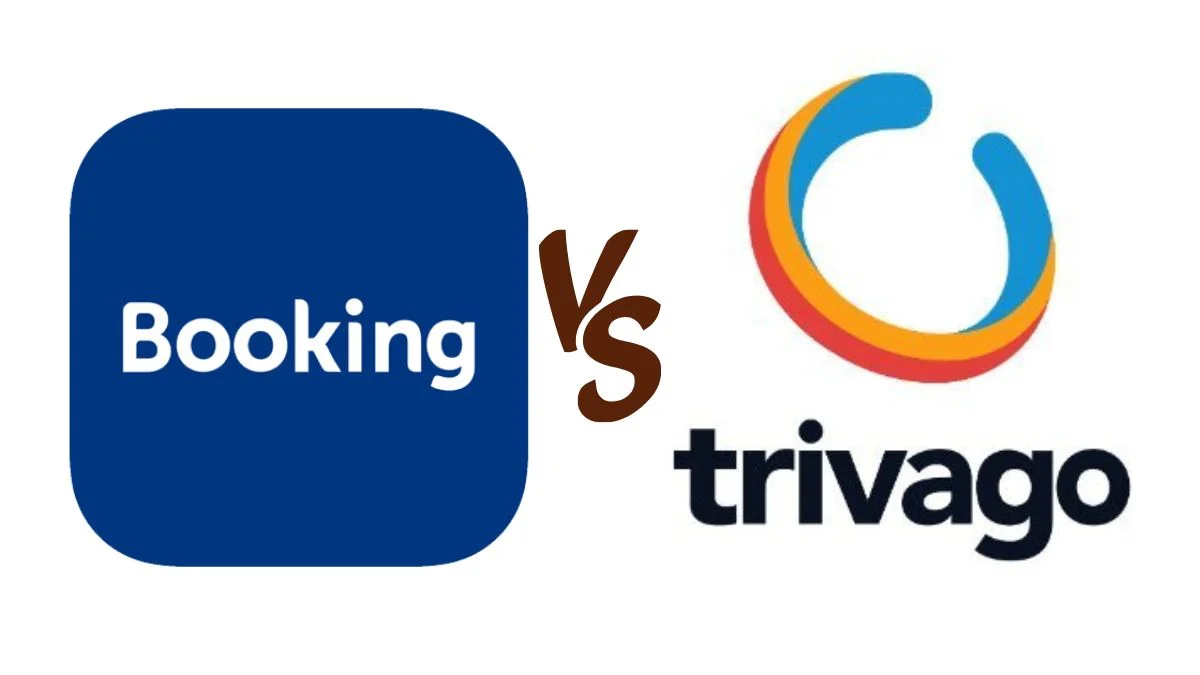Booking.com vs. Trivago: An In-depth Look into the Battle of Online Travel Marketplaces

As participants in Amazon Associates and other programs, we earn from qualifying purchases. This comes at no additional cost to you. For more details, see our Affiliate Disclosure.
In the rapidly evolving world of online travel marketplaces, two giants have emerged as dominant players: Booking.com and Trivago. Both platforms offer travelers an extensive array of choices for accommodations, flights, and other travel-related services, but they also compete fiercely to capture market share.
This article delves into an in-depth comparison of Booking.com and Trivago, exploring their similarities, differences, and unique strategies in their relentless battle to win the hearts (and wallets) of globe-trotters worldwide.
Introduction to Booking.com and Trivago
In the crowded space of online travel platforms, Booking.com and Trivago stand out as two of the most recognizable names. Both companies have carved out their own unique paths, offering a diverse range of services to travelers across the globe.
History and Background
Booking.com
Founded in 1996, Booking.com started as a small Dutch startup focused on hotel reservations. Over the years, it has grown into one of the world’s leading digital travel agencies, providing everything from hotel rooms to flights, car rentals, and even tours and activities.
Trivago
Trivago came onto the scene a decade later in 2005, with a specific emphasis on hotel price comparison. Based in Germany, Trivago’s innovative metasearch engine allows users to compare hotel prices from various booking sites quickly and efficiently.
Mission and Vision
Booking.com
Booking.com’s mission revolves around making travel easier, more accessible, and enjoyable for everyone. Its extensive network of accommodation options aims to provide travelers with flexibility and choice, catering to various budgets and preferences.
Trivago
Trivago’s vision is to be the traveler’s first and independent source of information for finding the ideal hotel at the lowest price. They emphasize transparency and empowerment, enabling users to find the best deals without hidden fees or complications.
Market Presence
Booking.com
With a presence in over 220 countries and territories, Booking.com’s reach is truly global. Its platform is available in 40+ languages, catering to a diverse international audience and offering more than 28 million reported accommodation listings.
Trivago
Operating in 55 localized websites and available in 33 languages, Trivago also boasts an impressive global footprint. By focusing on hotel price comparison, Trivago has become a go-to platform for travelers looking to find the best value for their stay.
Comparison of User Interface and Experience
In today’s digital age, the user interface and overall user experience play a pivotal role in determining a platform’s success. Both Booking.com and Trivago have invested in making their platforms user-friendly, but they have taken different approaches. Below is an analysis of their user interface and experience.
Website Design and Usability
Booking.com
Booking.com’s website design is clean, intuitive, and responsive. With a prominent search bar, filters, and call-to-action buttons, it guides users effortlessly through the booking process. Visual cues, such as ratings and reviews, further enhance the decision-making process for travelers.
Trivago
Trivago’s website also prioritizes user-friendliness, with a focus on hotel price comparison. Its interface is geared towards showing various price options from different providers, allowing users to make informed decisions quickly. The design might seem busier, but it aims to provide comprehensive information at a glance.
Mobile App Comparison
Booking.com
Booking.com’s mobile app is feature-rich, providing all the functionality of the desktop site. With a user-friendly design, it offers real-time notifications, mobile-exclusive deals, and easy access to booking details.
Trivago
Trivago’s app mirrors its website’s focus on price comparison, with a simple and intuitive design. While it might not have as many features as Booking.com’s app, it excels in providing quick and efficient hotel comparisons on the go.
Customer Support
Booking.com
Booking.com’s customer support is available 24/7 in multiple languages, offering various channels such as phone, email, and live chat. Their commitment to customer service is evident in their extensive FAQ section and personalized assistance.
Trivago
Trivago’s customer support is more limited, as they primarily direct users to the individual booking sites. However, they do provide assistance with website-related issues and have a helpful FAQ section to guide users through common queries.
While both Booking.com and Trivago prioritize user-centric designs, they differ in their execution and focus. Booking.com offers a more comprehensive experience with added features and robust customer support, while Trivago’s platform is more streamlined, focusing on efficient hotel price comparisons.
Both interfaces cater to their respective target audiences, reflecting their unique brand identities and core competencies in the online travel marketplace.
Services and Offerings
In the ever-competitive online travel marketplace, the range and quality of services and offerings can be a significant differentiator. Booking.com and Trivago, while operating in the same industry, have distinct approaches to their services. Let’s explore their offerings in detail:
Accommodation Booking
Booking.com
Booking.com has a vast array of accommodation options, from hotels and apartments to unique stays like treehouses and igloos. With over 28 million listings, users can find accommodation that suits their preferences, budgets, and travel requirements.
Trivago
While Trivago also offers an extensive range of accommodations, its main strength lies in its price comparison engine. It aggregates offerings from various travel sites, providing users with a quick and easy way to find the best value for their chosen stay.
Flight Reservations
Booking.com
In addition to accommodations, Booking.com provides a seamless experience for booking flights. Their platform integrates flight search and booking options, allowing travelers to plan entire trips in one place.
Trivago
Trivago, on the other hand, maintains a focused approach on hotel bookings and comparisons. They don’t directly offer flight reservations as part of their primary service.
Car Rentals and Other Services
Booking.com
Booking.com’s services extend to car rentals, airport taxis, and even restaurant reservations in some locations. Their goal is to provide a one-stop travel planning solution, and their additional offerings reflect this mission.
Trivago
Trivago keeps its focus narrow and excels in what it does best – hotel comparison. While it does not provide car rentals or other travel-related services directly, its specialized approach allows users to find the best hotel deals efficiently.
Booking.com and Trivago have unique service offerings that cater to different traveler needs. Booking.com positions itself as a comprehensive travel planning platform, offering a wide range of services from accommodations to flights and car rentals. Trivago, on the other hand, specializes in hotel price comparison, providing a more focused but highly effective service.
These differences reflect the distinct brand identities and strategies of the two platforms, each appealing to a specific segment of the travel market.
Marketing and Advertising Strategies
In the battle for supremacy in the online travel marketplace, marketing and advertising play a crucial role in attracting and retaining customers. Booking.com and Trivago have both engaged in creative and far-reaching campaigns to establish their brands. Here’s a closer look at their strategies:
Campaign Analysis
Booking.com
Booking.com’s advertising campaigns often focus on the sheer variety of experiences and accommodations available on their platform. Utilizing vibrant visuals and storytelling, they emphasize the joy and ease of travel planning with Booking.com. Their tagline “Booking.yeah” has become synonymous with positive travel experiences.
Trivago
Trivago’s marketing is centered around the idea of finding the best hotel for the best price. They have famously used the “Trivago Guy” or “Trivago Woman” in various markets to guide users through the process of comparing hotel prices. Their commercials are designed to be straightforward and informative, emphasizing value.
Target Audience
Booking.com
Booking.com targets a broad audience, catering to both leisure and business travelers. Their marketing efforts appeal to various demographics, focusing on the universality of travel and the need for a hassle-free booking experience.
Trivago
Trivago’s advertising is more targeted towards price-conscious travelers, especially those looking for hotel deals. They aim to appeal to users who prioritize value and are willing to invest time in comparing prices to find the best offer.
Brand Partnerships
Booking.com
Booking.com has engaged in various partnerships with airlines, travel influencers, and even entertainment platforms to expand its reach. Collaborating with well-known brands and personalities helps strengthen its position as a comprehensive travel platform.
Trivago
Trivago’s partnerships often align with its core focus on hotel comparisons. Collaborating with travel bloggers, review sites, and other travel platforms, they reinforce their reputation as a trusted source for hotel information and deals.
Both Booking.com and Trivago have developed strong marketing and advertising strategies to position themselves in the market. Booking.com leverages its wide array of offerings and emphasizes the joy of travel, while Trivago focuses on its niche of hotel price comparison, targeting value-seekers.
The way these platforms approach marketing not only reflects their respective business models but also shapes the perceptions and expectations of their audiences. Their tailored strategies illustrate the importance of understanding and engaging with customers in a competitive online marketplace.
Financial Overview and Business Models
Booking.com and Trivago operate in a dynamic and competitive environment, and their financial health and business models are key factors in their sustainability and growth. Let’s explore the economic landscapes and core revenue mechanisms of these two industry giants:
Revenue Streams
Booking.com
Booking.com primarily generates revenue through commissions on bookings made through its platform. Whether it’s a hotel reservation, car rental, or flight, Booking.com takes a percentage of the transaction. They also offer a premium subscription service for property owners and businesses that gives added exposure and benefits.
Trivago
Trivago’s main revenue stream comes from a cost-per-click (CPC) model. When a user clicks on a hotel offer and is redirected to the booking site, Trivago earns a fee. Additionally, Trivago offers advertising opportunities for hotels and travel agencies to increase their visibility on the platform.
Profit Margins
Booking.com
With a diversified portfolio of services, Booking.com has been able to achieve healthy profit margins. Their wide reach and volume of transactions allow them to negotiate favorable terms with partners, contributing to profitability.
Trivago
Trivago’s specialized focus on hotel comparison might lead to slimmer profit margins compared to Booking.com. They rely on high volumes of user traffic and click-throughs to generate revenue. However, their lean operation model and efficient marketing strategies support their financial stability.
Growth Trends
Booking.com
Booking.com has seen consistent growth over the years, fueled by global expansion, continuous innovation, and strategic partnerships. Their comprehensive service offerings and strong brand presence have contributed to an increasing customer base and market share.
Trivago
Trivago’s growth has been more fluctuating, impacted by market competition and changes in online advertising dynamics. Their niche focus on hotel comparison gives them a unique position, but it also means they face specific challenges and opportunities in scaling their business.
Booking.com and Trivago’s financial landscapes and business models reveal fundamental differences in their approach to generating revenue and growth. Booking.com’s diverse service offerings and commission-based model have facilitated robust financial performance, while Trivago’s CPC model and targeted focus on hotel comparison reflect a more specialized approach.
Understanding these financial dynamics offers valuable insights into their competitive strategies and potential future developments in the ever-changing online travel marketplace.
Challenges and Controversies
In the fast-paced world of online travel, challenges and controversies are inevitable. Both Booking.com and Trivago have faced their share of hurdles, and how they’ve managed these situations offers insights into their resilience and ethical considerations. Let’s delve into some of the key challenges and controversies:
Legal Battles
Booking.com
Booking.com has faced legal issues in various jurisdictions, ranging from antitrust concerns to disputes over rate parity clauses with hotels. Some countries have investigated and challenged their practices, questioning whether they limit competition or mislead consumers.
Trivago
Trivago has also encountered legal challenges, particularly around advertising practices. Accusations of displaying misleading price comparisons have led to scrutiny and fines in some regions, casting a shadow over their credibility.
Customer Complaints
Booking.com
Customer complaints for Booking.com have ranged from issues with cancellations, refunds, and misrepresented property listings. Addressing these concerns is a constant challenge, given the vast number of partners and transactions on their platform.
Trivago
Trivago’s challenges with customer complaints often revolve around the accuracy and transparency of their hotel comparisons. Users have occasionally accused the platform of favoring advertisers or not providing a fully unbiased comparison.
Industry Challenges
Booking.com
Booking.com faces industry-wide challenges such as fluctuating travel regulations, economic downturns, and shifts in consumer behavior. Adapting to these macro-level factors requires agility and innovation.
Trivago
Similar to Booking.com, Trivago must navigate the complex landscape of global travel trends and regulations. Their specialized focus on hotel comparison might expose them to specific risks and opportunities tied to the hotel industry’s health.
Booking.com and Trivago, while leading the online travel space, have not been immune to challenges and controversies. From legal battles to customer satisfaction and broader industry hurdles, both companies must continually evolve and adapt.
How they manage these issues not only impacts their reputation but also shapes their strategic decisions moving forward. Analyzing these challenges offers a nuanced understanding of the complexities inherent in the online travel marketplace, providing a more comprehensive view of these two prominent platforms.
Booking.com vs. Trivago: Which One is Best For You?
The battle between Booking.com and Trivago in the online travel marketplace is a clash of giants, each with its strengths, offerings, and unique approach. So, which one is better for you? Let’s break it down:
For Comprehensive Travel Planning: Booking.com
If you’re looking for a one-stop shop for all your travel needs, from accommodations and flights to car rentals, Booking.com is likely the better choice.
Its wide array of options, user-friendly interface, and additional services provide a more comprehensive travel planning experience.
Whether you’re a leisure traveler or on a business trip, Booking.com’s versatility might make it the more suitable platform.
For Hotel Price Comparison: Trivago
On the other hand, if your primary concern is finding the best price for hotel stays, Trivago’s specialized focus on hotel price comparison makes it a standout option.
By aggregating prices from various travel sites and providing a straightforward comparison, Trivago offers an efficient way to ensure you’re getting the best deal on your chosen accommodation. For value-seekers, Trivago may be the way to go.






